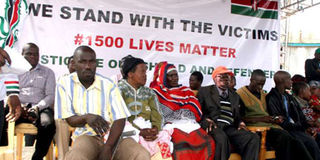Kenyan politics is very scary right now, but there’s a prayer

Post-election violence victims convene at Kamukunji grounds in Kibera on April 16, 2016. Eight years later, even with the National Cohesion and Integration Commission, a new Constitution, and laws against hate speech, those events have not changed the political, or, even intellectual, culture. PHOTO | NATION MEDIA GROUP
What you need to know:
- But not all is lost. The thing is that when political activity, even if it be violent, and ethnic mongering are open, you see and you can prepare to stop it or protect yourself.
- The very divisive issue of President Uhuru Kenyatta’s and Deputy President William Ruto’s case at the ICC eviscerated the last remaining grounds on which Kenya’s political centre stood.
If you were not frightened by the events in Kenyan politics of the past few weeks, then perhaps it is because you eat lion liver for breakfast.
One of the most disturbing things has been the hate speech, leaders saying things about rivals and other nationalities that would be a kiss of political death in many countries.
But in Kenya, the ethnic flame throwers have very passionate supporters.
The turnaround of the past month has been truly remarkable. Consider, for example, this story that was moved by Bloomberg on May 24, 2016.
Headlined “Kenyan Political Risk Low Before 2017’s Election, Exotix Says”, it said “Kenya’s political risk is ‘relatively low’ before next year’s elections, with recent protests having little impact on economic activity,” said Exotix Partners LLP.
“Demonstrations demanding reforms to the country’s electoral authority are ‘the clearest mobilisation of opposition elements since the 2013 election,"' the London-based company said in an e-mailed note.
“Though there’s been violence, ‘pre-election political risk is relatively low, by Kenyan standards,’ because of factors including the unity of the governing coalition and divisions within the opposition Coalition for Reforms and Democracy, Exotix said.”
That was before the deaths at the Opposition protests and politicians on both sides added that very deadly element — ethnic agitation — to the mix.
But not all is lost. The thing is that when political activity, even if it be violent, and ethnic mongering are open, you see and you can prepare to stop it or protect yourself.
I know of businessmen in Uganda who are saying that this time they will “not be caught out”; they will stock raw materials and imported supplies for many months in case there is another disruption next year.
Also, this week, it seems many people finally hit the panic button and on Kenyan social media a concerted pushback against the tribal merchants started to form.
Despite all that, it must be said that a society without conflict is a dead one.
So the more concerning thing about Kenya today is not primarily the hate speech, but the fact that if one looks ahead, it is hard to see an institution or cultural shift that will ensure that it burns out, rather than burns up.
The post-election violence of 2008 was the wake up call the doctor ordered for Kenya.
However, eight years later, even with the National Cohesion and Integration Commission, a new Constitution, and laws against hate speech, those events have not changed the political, or, even intellectual, culture.
Several of Kenya’s national institutions, such as churches and mosques, have been discredited by either participation or acquiescence in the post-election or jihadist violence.
A DIVERSION
The fact that the expansion of democracy has led to hotly contested elections with small margins of victory means there is no national political party with an overwhelming majority and, therefore, lacks the confidence to give concessions in political negotiations, for example over the current scuffle over the electoral commission.
There are hardly any “junior partners” in both government and opposition coalitions, and every single political position has become too critical to the balance of power, leaving little wiggle room and feeding hardline positions.
The very divisive issue of President Uhuru Kenyatta’s and Deputy President William Ruto’s case at the ICC eviscerated the last remaining grounds on which Kenya’s political centre stood.
This has led many to worry that when the doodoo hits the fan, there are no national figures left to stop it from flying around the land.
There are some things that can be done to prevent the worst. As the Romans found out centuries ago, in politics you need a circus to soak up the energies of restless masses, hence the gladiator fights.
But times have changed. The equivalent these days could be grand projects. If the standard gauge railway were to reach Kisumu before the elections, it would create a wave of national pride that could overcome the worst politics.
If Kenya were to take a place among the top three at the Rio Olympics, there would be a huge lift that would start it all.
Collins Injera needs to keep breaking more rugby records and Lupita Nyong’o winning another Oscar next year for her role in the film, Queen of Katwe, about an unlikely world-beating chess prodigy in a Ugandan slum, could juice up things too.
We know it is banking too much on hope, but it is better than nothing.
The author is editor of Mail & Guardian Africa. Twitter@cobbo3





